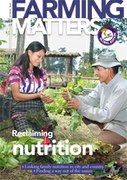We are told that high input agriculture will boost food production in Africa. A persistent worry for Million Belay is the loss of knowledge related to our nutritious, traditional crops if they succeed.

We have a lot of varieties of teff in Ethiopia. Some estimate more than 60. I remember asking a group of students in 2002 about the value of having all this diversity. They came back the next day and said that they are needed for different soil types and altitudes, and the crop is also valued for cultural ceremonies and especially by women as it is very nutritious and important for children. Asked about the current situation, they said their parents told them that many varieties are being lost.
This raises a lot of questions. Why was teff not valued nutritionally by ‘the educated’ before, and what would have happened if we had lost this diversity forever? How many nutritional food plants are out there that we do not yet know about? The world has lost over 93 per cent of its seed varieties and is relying on a dwindling reserve. Are the new hybrid seeds, the central components of large scale agriculture, as nutritious as grains like teff? Research has shown that the food grown organically by smallscale farmers is much more nutritious than food from industrial processes.
A persistent worry for me is the loss of knowledge related to these nutritious crops. The story of the students shows how the youth are not learning from their parents. How then can we transfer this wisdom to the next generation? What will happen if that knowledge is lost? One of the biggest conferences on Green Revolution technologies was recently held in Ethiopia. The main outcome was that high input agriculture was needed to boost food production in Africa. What then will be the fate of the many unknown, undervalued and potentially nutritious crops if and when they succeed?
Million Belay
Million Belay is the director of the Movement for Ecological Learning and Community Action (MELCA), Ethiopia, and the coordinator of the Africa Food Sovereignty Alliance. He has been our regular columnist during 2014, and we thank him for his insights throughout the year.
Email: millionbelay@gmail.com
Twitter: @million_belay

